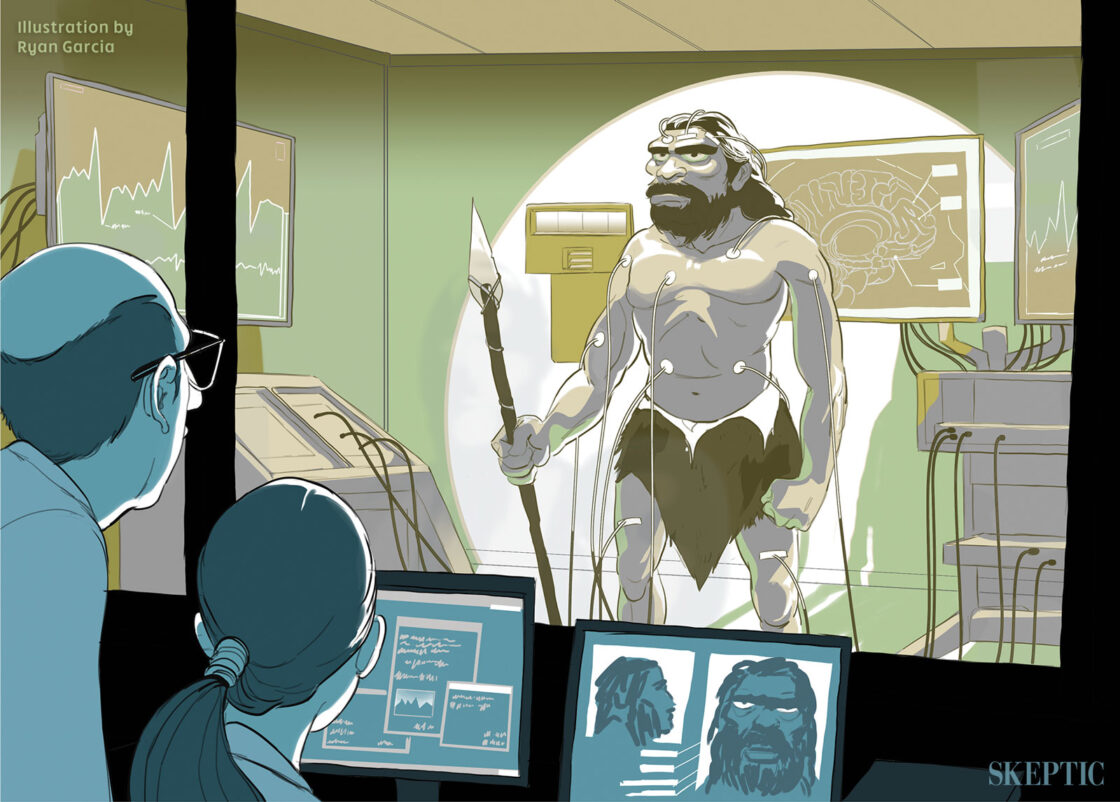In the last few years, there has been a stream of publications, especially in the United States, aimed at establishing a new basis for the study and teaching of African and African-American culture. Whether or not they actually use the word “Afrocentric” on their packaging, these books — which differ enormously in the quality of their thought and writing, as well as in their factual reliability — have a certain common set of pre-occupations, whose persistence entitles one now to speak of an Afrocentric paradigm. Since one of the themes of Skeptic is the study of the power of belief systems to shape our interpretation of nature and history, the Afrocentric paradigm should be treated no different from others. That is, a healthy dollop of skepticism and critical thinking is appropriate.
The Afrocentric Paradigm
The Afrocentric belief system has two basic elements, one critical, the other positive, which are either argued or taken for granted. The negative thesis is that modern Western scholarship on cultural matters, high and low, is hopelessly Eurocentric. This means, to begin with, that Western scholarship understands European history, intellectual life and social institutions as an ideal type, both normatively and descriptively. But Eurocentric work also displays an inability, rooted in prejudice, to enter sympathetically into the forms of life of non-Europeans, and, especially, of black people of African descent. As a consequence, Western scholarship presupposes (so the story goes) that Africans have produced little of much cultural worth, and that cultural works of sophistication or value (like the architecture of Great Zimbabwe or the Pyramids), even when they are in Africa, are unlikely to have been produced by black people. In support of this Eurocentric thesis, some (and ironically a great deal of) work goes into showing that European scholars, at least since the Enlightenment, have concealed facts about the African origins of certain central elements of Western civilization; notably the Egyptian origins of the Greek “miracle” and the black African origins of the Egyptian “miracle.” Some go so far as to proffer conspiracies of confiscated histories and “stolen legacies” (see Mary Lefkowitz’ essay this issue).
This negative thesis is argued as the prolegomenon to an alternative, positive, “Afrocentric” view, in which African cultural creativity is discovered to have been at the origin of Western civilization, while Western civilization, especially modern Western civilization, is either asserted or implied to be morally depraved; incapable, in particular, of living peacefully with others. The most extreme version of this is the “sun people” — ”ice people” pseudohistory, presented by Leonard Jeffries at New York’s City College and others, of the black sun people being cooperative, collective, and peaceful, and the non-black ice people as competitive, individualist, and exploitative. We (sometimes all of us, sometimes just those of us who are black) are urged, then, to centre on African history (and particularly the history of the Egypt of the Pharaohs) and return to African values.
The Afrocentric paradigm is not just the source of a lively body of writing; it is the basis of a movement in the United States to revise the teaching of African-American children and to provide them with an Afrocentric education. Here the argument is that the Eurocentricity of what is taught in American schools, at best, fails to nurture, and, at worst, actively damages the selfesteem of black children, and that what these children need instead is a diet of celebratory African history (held to begin in Egypt, and in an Egyptian civilization held to be black) and the transmission of African values.
These values are often now taught in the version developed by Maulana Karenga and associated with the invention of a feast called “Kwanzaa,” designed to provide an African celebration to go with Christmas and Hanukkah. (American children are taught Swahili words, naming various allegedly African virtues, as their proper inheritance. There is something of an irony in the use of Swahili as an Afrocentric language since hardly any of the slaves brought to the New World can have known it, and it was, in fact, being used in a culture in which slave-trading to the Arabian peninsula was a major element of the economy.) This particular brand of Afrocentrism goes under the label of “Kemetism” (“Kemet” being a name for ancient Egypt); and the whole package can be found in a recent book by Moléfi Kete Asante, one of the intellectual leaders of the movement, entitled Kemet, Afrocentricity, and Knowledge.
At least as important as any published work is a body of Afrocentric lore transmitted in public lectures and in discussion groups by figures who have tended in recent years to combine Afrocentrism with a peculiar anti-Semitism, which is preoccupied with attributing special responsibility for the ills of the black world to a Jewish conspiracy. Many of the leading rap stars seem to subscribe to such views, combining them with their well-known misogyny and homophobia, to produce a cultural brew as noxious as any currently available in popular culture. The diagnosis of this particular pathology is the subject of much current speculation among observers of African-American culture.
The scholarly end of the Afrocentric movement has one major hero: Cheikh Anta Diop, the Senegalese man of letters, after whom the university in Dakar is now named. Diop argued, over many years (beginning in the 1950s), for the thesis of the African origins of Greek civilization. In such works as L’Unite Culturelle de l’Afrique Noire, Antériorité des Civilisations Négres, Nations Négres et Culture, Fondements Économiques a Culturels d’un État Fédéral d’Afrique Noir, and Parenté Génétique de l’Égyptien Pharaonique et des Langues Négro-Africaines, he pursued a complex agenda, in which the splendors of Egypt were seen as a reason for contemporary African pride, and the cultural unity derived from a common African source as the basis for modern African political unity.
Insight or Illusion?
Like most cultural movements at full flood, this Afrocentrism is a composite of truth and error, insight and illusion, moral generosity and meanness. But the most striking thing about it is how thoroughly at home it is in the frameworks of 19th century European thought. (One of the symptomatic features of much Afrocentric writing is that the antagonists it identifies are largely dead.) Afrocentrism, in short, seems very much to share the presuppositions of the Victorian ideologies against which it is reacting. Take, for example, the preoccupation with the ancient world. The academic curriculum of the 19th century traced Western civilization to roots in ancient Greece. Afrocentrists have simply challenged the old priority of the (white) Greeks, by replacing them with (black) Egyptians. There are, of course, genuine issues for discussion here about the relations between different parts of the ancient Mediterranean and the Greek “miracle.” Martin Bernal (not, by my account, an Afrocentrist, because he does not support the positive agenda of the movement) is a hero for Afrocentrists because, in Black Athena (Volume One, 1987; Volume Two, 1991), he has taken up the challenge of refuting the modern view that the Greeks owed nothing of importance to Egypt. So far as I can see, there is now a consensus that Bernal has convincingly demonstrated the role of prejudice against blacks and Jews in classical scholarship from the Enlightenment onwards, but has not established decisively his own positive account of ancient history. That is, biased historians did not get the story right, but neither has he.
But it is not this quite genteel academic debate that has drawn Bernal to the Afrocentrists’ attention. For it is essential not only to agree with Bernal’s account of ancient intellectual history but also to insist, in Diop’s words, that “Ancient Egypt was a Negro civilization [and]…the moral fruit of their civilization is to be counted among the assets of the Black world….“And on this matter Bernal has little to say. Fortunately he did not have to argue for this secondary thesis, since it is taken to be implicit in his original title, African Athena (the title Bernal preferred). Egyptian Athena would have left the racial issue open. Black Athena (his publisher’s choice) does not.
This preoccupation with racial matters is very much a response to the 19th-century formulation of the issues, when to the classicism of the Enlightenment there was added the thought that the Western heritage was a racial possession. Which is to neglect not only Egyptian influences on the Greeks, but such minor embarrassments as the centrality of Jewish contributions to Western high culture, and the key role of the Arabs in maintaining the intellectual tradition that linked Plato to the Renaissance. It depends on a way of thinking about culture and biology which is bound to be discomfited by those scholars, black, brown and yellow, who have taken possession of Western culture in the late 20th century and mastered it; at the same time as many of the supposed racial heirs of the West have been immersed in a popular culture “contaminated” by African rhythms.
But in our day racialism surely does not need arguing against in serious company. Do we not all know that the interconnections and interdependences of biology and culture are complex and multiple, that the old simplicities of racialism have not stood the test of exposure to the evidence? Perhaps, or, then again, perhaps not. After all, Afrocentrist interest in the color of the ancient Egyptians presumably derives from the thought that if they were black then they were of the same race as contemporary black Africans and their New World cousins. And unless you conflate biology and culture, why should that matter?
It is hard to find in the Afrocentrist literature a clearer answer to this question than the passage from Diop I quoted earlier. Racial identity with the Egyptians makes their achievements a moral asset for contemporary blacks. (Of course, if Greece grew out of Egypt and “the West” grew out of Greece, then the West too is a moral asset of contemporary blacks, and its legacy of ethnocentrism presumably one of our moral liabilities. You cannot claim credit for Western civilization without also accepting its biases…. But I digress.) Perhaps this is why Black Athena and The African Origin of Civilization sell so well on the streets of Harlem. And if so, this is a reason that would have been entirely congenial to the 19th-century Eurocentrists whom Afrocentrism aims to refute.
Eurocentrism Upside-Down
Once we see the essentially reactive structure of Afrocentrism — that it is simply Eurocentrism turned upsidedown — we can understand where its intellectual weaknesses lie. It is not surprising, for example, that in choosing to talk about Egypt and to ignore the rest of African and African history, Afrocentrism shares the European prejudice against cultures without writing. Eurocentrism, finding there a literate culture and a significant architecture, set about claiming that Egypt could not be black. Afrocentrism chooses Egypt because Eurocentrism had already made a claim on it.
Similarly, we should not be surprised at one of the most tiresome features of Afrocentrism, namely its persistence in what the Beninois philosopher (and current Minister of Culture) Paulin Hountondji has called “unanimism”: the view that there is an African culture to which to appeal. It is surely preposterous to suppose that there is a single African culture, shared by everyone from the civilizations of the Upper Nile thousands of years ago to the thousand or so language-zones of contemporary Africa?
In aiming to identify some common core of African civilization, the Afrocentrists seem once again to be responding to earlier attempts to identify a common core of Western culture. One can be forgiven for wondering how unitary the West really is today. But it was always a strange idea that Alexander, Alfred, and Frederick the Great had something in common with each other and with the least of their subjects, which could be called Western culture. And in Africa, where whatever continuity there has been through all this time has not been mediated by even the broken textual tradition that in some sense unites “Western culture,” it is not only a strange idea but a silly one.
ntu and ing
A final irony is that Afrocentrism, which is offered in the name of black solidarity, has, by and large, entirely ignored the work of African scholars other than Diop. (This fact tends to be concealed because African-American scholars like Asante and Karenga have adopted African names.) Thus, much play has been given to another major source-book for the Afrocentrists, Janheinz Jahn’s Muntu: African Cultures and Western World, a work that appeared in English translation in the United States with great éclat in the early 1960s. The book revolves around the concept of ntu, the stem of the Kinyaruanda-Bantu words muntu (person), kintu (thing), hantu (place and time) and kuntu (modality); “ntu,” Jahn wrote with the gravitas of revelation, “is the universal force as such.”
Reading this, I found myself drawn into a fantasy in which an African scholar returns to her home in Lagos or Nairobi, with the important news that she has uncovered the key to Western culture. Soon to be published: THING: Western Culture and the African World, a work that exposes the philosophy of ing, written so clearly on the face of the English language. For ing, in the Euro-American view, is manifestly the inner dynamic essence of the world. In the structure of the terms doing and making and meaning, the English (and thus, by extension all Westerners) express their deep commitment to this conception. But the secret heart of the matter is captured in their primary ontological category of thing: every th-ing (or be-ing as their sages express the matter in the more specialized vocabulary of one of their secret societies) is not stable but ceaselessly changing. Here we see the fundamental explanation for the extraordinary neophilia of Western culture, its sense that reality is change.
The notion that there is something unitary called African culture that could thus be summarized has been subjected to devastating critique by a generation of African intellectuals. But little sign of these African accounts of African culture appears in the writings of Afrocentrism. Molefi Asante has written whole books about Akan culture without referring to the major works of such Akan philosophers as J. H. Danquah, William Abrahams, Kwasi Wiredu and Kwame Gyekye. And I am reliably informed that, on one occasion not so long ago, a distinguished Zairian intellectual was told by an African-American interlocutor that “We do not need you educated Africans coming here to tell us about African culture.”
Toward a Benevolent Afrocentrism
Since it is productive to promote positive critical thinking along side more traditional “debunking” of extraordinary claims, among the best-written and argued Afrocentric books I have read is Clinton M. Jean’s Behind the Eurocentric Veils: The Search for African Realities. Professor Jean begins with a two-part defense of the negative thesis. The first chapter shows, by a careful reading of Western ideological writings, and especially of the 19th-century social analyst Max Weber, mainstream sociology is Eurocentric; the second chapter demonstrates the same for radical theory, and especially for Marx and Marxism. Professor Jean’s third chapter, whose somewhat polemical title is “For Those Who Think That Black Studies Can Be Too Nationalistic,” takes up some of Diop’s ideas (especially from L’Unité Culturelle de l’Afrique Noire) to defend a view of African culture as centrally more humane than Western culture. Like all too many Afrocentrists, Jean does not seem very interested in what Africans other than Diop have had to say about the matter. But unlike many of them, he seems to be inviting everyone, not only those of us who are black, to draw on Africa’s resources of humanism. In this sense, then, the more minds we have working on any given problem of humanity, the better.

This article appeared in Skeptic magazine 2.4 (1994).
Buy print edition
Buy digital edition
Subscribe to print edition
Subscribe to digital edition
This, then, is a benevolent and generous Afrocentrism, and I wish I could agree with more of its substantial claims. But the fact is that unanimism seems to me both theoretically unlikely and quite incompatible with the evidence. Jean tells me nothing to quiet these doubts. And while any sane person must agree that horrendous crimes, almost incommensurable with those of the past, have been committed recently in the West, it hardly seems plausible that African cultures possess some intrinsic humanism; true, Africa did not develop the murder industry of the Holocaust, but cruelty and unkindness are not Western prerogatives, any more than intelligence and creativity (and there have been some not so insignificant runner-ups to Hitler and the Nazis). And even if something called “African culture” had all the features Professor Jean claims for it, you would need more than a few quotes from Diop and Basil Davidson and a passage from Meyer Fortes and Evans-Pritchard to prove it. The proper response to Eurocentrism is surely not a reactive Afrocentrism, but a new understanding that humanizes all of us by learning to think beyond race. ![]()
A different version of this essay appeared in the February 12, 1993 issue of the Times Literary Supplement. Reprinted with permission of the author.
About the Author
Dr. Kwame Anthony Appiah is Professor of Afro-American Studies and Philosophy at Harvard University. He was raised in Ghana and educated at Cambridge in England, where he took both B.A. and Ph.D. degrees in philosophy. He is the author of In My Father’s House (1992, Oxford), which deals, in part, with the role of African and African-American intellectuals in shaping contemporary African cultural life. He is also the author of two mystery novels, Avenging Angel and Nobody Likes Letitia.
Professor Appiah’s scholarly interests range over African and AfricanAmerican intellectual history and literary studies, ethics, and philosophy of mind and language; and he has also taught regularly on philosophical problems in the study of African traditional religions. He has been Chairman of the Joint Committee on African Studies of the Social Science Research Council and the American Council of Learned Societies. He has taught at the University of Ghana, at Cambridge, and at Yale, Cornell, and Duke Universities.
This article was published on February 11, 2021.

















Wow. That was very good – it makes a case empirically and that appeals to me – it is hard to believe that it was written almost 30 years ago.
During that same era there were scholarly efforts to delegitimize the works of science. I recall one talk at a prestigious University by a scholar arguing that ‘science’ is no better or worse than any (other) mythology – they all have their own ‘facts’ …. ‘alternate facts’ you might say. Who is to say who is right and who is wrong?
Years later when I heard the term ‘alternate facts’ used by conservative politicians I smiled to myself that liberal academia paved the road for them – along with global warming deniers. Right wing conspiracy nuts stand upon the shoulders of giants.
What a grand legacy…